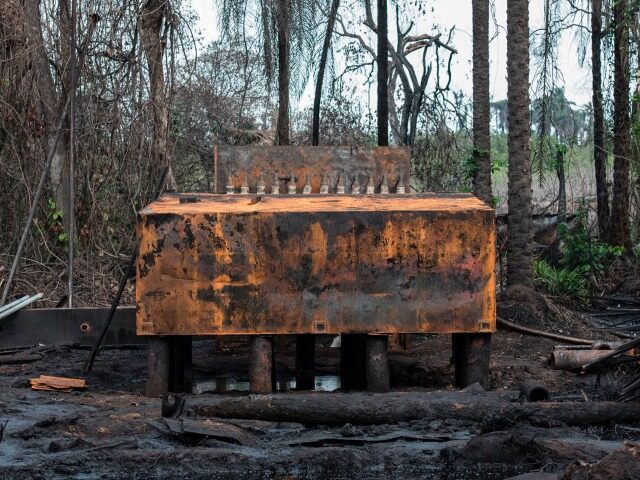The Premium Times of Nigeria on Tuesday published an update from the Nigerian government on its war against oil poachers. According to the Eastern Command of the Nigerian Navy, 27 smuggling vessels were captured over the past year, and 294 illegal refineries were located and shut down.
The upbeat assessment was provided by outgoing Eastern Naval Command chief Rear Adm. Ibrahim Dewu, who is handing his command over to Rear Adm. Olusola Oluwabgire. Dewu has been in charge of the Eastern Naval Command since February 2022.
Dewu said that in addition to closing the refineries, his forces have destroyed or seized large amounts of “illegally refined diesel, kerosine, and crude oil.” He said some of the oil smuggling gangs busted by the Eastern Naval Command were also involved in kidnapping, which is a massive industry in Nigeria.
Dewu said that in addition to reducing smuggling and “piracy” on the open water, his command was involved in “clearance and swamp buggy operations” against illegal refineries and bandit camps located inland.
The outgoing commander also touted some “significant achievements in infrastructure” during his tenure, including security improvements, enhanced provisions for the welfare of naval staff, and remodeling the Eastern Naval Command headquarters with improvements such as a lounge, mini-mart, sports hall, conference room, and gym.
Oil smuggling is a huge problem in Nigeria, so huge that the government has been racing to open new oil and gas fields to replace the incredible tonnage lost to thieves. At the beginning of this year, state oil company NNPC estimated that a third of Nigeria’s oil production has been stolen.
Some of the oil thieves are individuals and small groups of villagers poaching oil from the huge and poorly-protected pipelines that run through rural Nigeria, while others are sophisticated gangs and revolutionary militant groups. The hundreds of “mom and pop” illegal taps dotting Nigeria’s pipelines are major safety and environmental hazards.
On the other end of the spectrum, NNPC discovered a massive 2.5-mile undersea pipeline chugging huge quantities of oil from a major export terminal in October.
Previous efforts to crack down on oil piracy have been thwarted by disorganized police and military operations, poor knowledge of the rural terrain where most thieves operate, payoffs to corrupt officials, and the lingering fear that major operations against ramshackle pirate taps and refineries could cause gigantic explosions.
Nigerian police began turning things around after the October discovery of the undersea pirate pipeline by controversially hiring a former oil thief ringleader and revolutionary militant, ironically named Government Ekpemupolo, as a consultant. Ekpemupolo was reportedly able to give Nigerian forces valuable intelligence on how to locate illegal refineries and catch smugglers, as reflected in the interdiction successes claimed by Rear Adm. Dewu.
On the other hand, while arrests and seizures are ostensibly up, Nigerian House Speaker Femi Gbajabiamila on Tuesday cited government data that oil theft has gotten worse and now amounts to over $23 billion in annual losses.
“In the light of dwindling revenue accruing to Nigeria from crude oil sales, it was quite alarming to learn about whistleblower allegations that over $2.4 billion in possible revenue by the country was lost from the sale of 48 million barrels of Nigeria’s crude oil cargoes in China,” Gbajabiamila said during a speech to inaugurate a special panel to investigate government corruption and oil piracy.
The oil sale to China referenced by the house speaker allegedly occurred in 2015 and was exposed by whistleblowers in 2020. A group of corrupt government officials led by Abba Kyari, a former chief of staff for President Muhammadu Buhari who died in 2020, allegedly arranged the sale of $2.4 billion in illegal oil to Chinese buyers.
The special panel will also investigate allegations that Nigerian officials attempted to silence the whistleblowers, including a plot to force them to sign non-disclosure agreements at gunpoint.

COMMENTS
Please let us know if you're having issues with commenting.